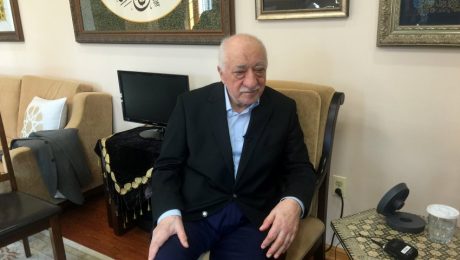Keyword: Fethullah Gulen

Public Enemy No. 1: A Visit with Fethullah Gülen, Erdogan’s Chief Adversary
In a meeting at his compound in Pennsylvania, Turkish cleric Fethullah Gülen defends himself against claims made by Turkey’s president that he was behind this weekend’s failed coup. He alleges that power has poisoned Erdogan.

Turkey Coup Attempt Leaves America With Stark Choice
In the aftermath of Turkey’s attempted, and failed, coup, Washington is primarily concerned about the future of the U.S.-Turkish alliance and its central objective these days: the fight against Islamic State (ISIS). In particular, U.S. policymakers are concerned about the fate of U.S. access to the Turkish airbase at Incirlik, from which assets used in […]

A Very Predictable Coup?
First of all, though it is not a major issue, none of us believes that Gulen was behind the coup. It is convenient for Erdogan to blame his principal opponent because it will facilitate the arrests of any and all opponents not linked to the actual coup by claiming that they are Gulenists.

Fethullah Gülen suggests Turkish coup attempt could have been staged
Islamic cleric who has been blamed by Turkey’s president for the coup attempt on Friday evening gives a rare interview and suggests that the event may have been staged by the Turkish government as a way to shore up power and excuse further arrests of those who oppose Recep Tayyip Erdoğan

Secretary Kerry insists Turkey must provide legal, solid evidence against Fethullah Gulen
We’ve never had a formal request for extradition, and we have always said, “give us the evidence, show us the evidence”. We need a solid, legal foundation that meets the standard of extradition in order for our courts to approve such a request.

Turkish coup attempt: who is Fethullah Gülen?
The Turkish government, including President Recep Tayyip Erdoğan, has pointed the finger at Fethullah Gülen – also known as leader of the Hizmet movement – as the mastermind behind Friday’s attempted coup by the country’s military. But who is Gülen? We take a look at the Islamic cleric and how he has affected Erdoğan’s presidency

Fethullah Gulen’s stance on democracy 1994-2016
Mr. Gulen has reiterated his clear stance on democracy, in the wake of the coup attempt in Turkey. Here is what he had said back in June 1994: “I believe, from now on, both in Turkey and in the rest of the world, there will we no going back from democracy.”
























